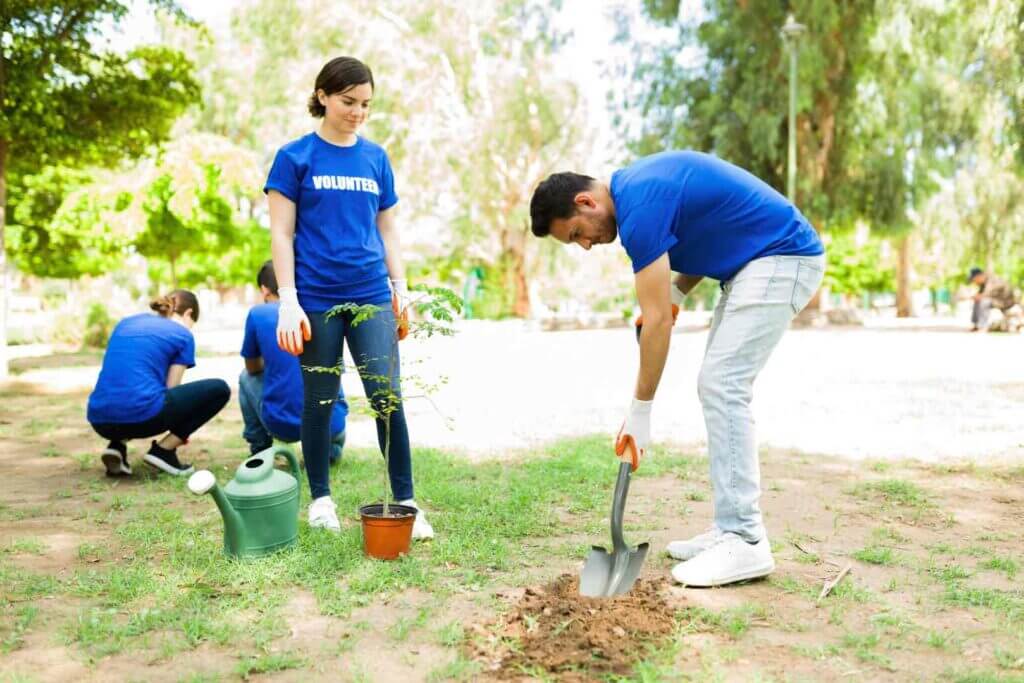Table of Contents
ToggleImagine a travel experience where you leave more than footprints – a journey where you make a lasting impact on the world. That’s the promise of voluntourism. By combining the thrill of exploration with acts of service, voluntourism offers a chance to travel with purpose, broaden your horizons, and support communities facing challenges. Yet, it’s crucial to approach voluntourism with careful planning and a mindful perspective to ensure it becomes a force for good.
Be sure to take a look at our other guides to Sustainable Travel, such as Biofuels & Sustainable Aviation: Changing the Future of Flight , Travel Mindfully: Reducing Your Travel Footprint.

Key Takeaways
- Voluntourism done right can be beneficial for both volunteers and communities, but it requires careful planning and ethical considerations.
- The “saviour complex” is a harmful dynamic in voluntourism. Always approach volunteering with humility and a willingness to learn from the host community.
- Choose reputable organisations that prioritise sustainable, community-led development over short-term, feel-good projects.
- Think critically about your skills and where they can be most impactful. Sometimes the most helpful way to volunteer is through fundraising and awareness efforts back home.
- Voluntourism is a journey, not a destination. Focus on cultivating meaningful connections, deepening your understanding, and supporting long-term positive change.
What is Voluntourism?
Defining Voluntourism:
At its core, voluntourism involves dedicating a portion of your travels to volunteer work in the communities you visit. This can take many shapes and sizes.
Types of Voluntourism Projects:
Common projects include teaching English, assisting with construction, supporting healthcare initiatives, participating in wildlife conservation, or working in community development.
The Rise of Voluntourism:
The desire to use travel as a tool for good has fueled the growth of voluntourism in recent decades. People want their experiences to be more meaningful, to contribute to a planet in need.
Related articles: Guides to Sustainable Travel

Why is Voluntourism Bad?
While well-intentioned, voluntourism carries real risks that must be addressed:
- The Dark Side of Voluntourism: Sadly, some voluntourism programs unintentionally cause more harm than good. Short-term placements with unskilled volunteers can take jobs away from locals or create unhealthy dependencies.
- Saviour Complex and “White Knight” Syndrome: Projects sometimes play into the damaging narrative of “helpless” communities needing Western intervention. This undermines local autonomy and perpetuates harmful stereotypes. Source: Driving Change.org
- Skills Mismatch: A weekend-long building project with untrained volunteers, for instance, might be slower and less effective than hiring skilled local labour. Enthusiasm doesn’t always equal impact.
FREE Travel Planner
Why is Voluntourism Good?
Despite the challenges, voluntourism holds significant potential when approached with the right mindset:
- Benefits to Communities: Voluntourists can provide essential support for projects in under-resourced areas. Building a school, providing healthcare, or assisting with conservation fill critical gaps, particularly in places with limited government or NGO support
- Benefits to Volunteers: Voluntourism is transformative. It fosters personal growth, a broader global perspective, and the development of valuable skills. Stepping outside your comfort zone builds cross-cultural understanding unlike any resort vacation can.
- Cultural Exchange: Done well, voluntourism sparks meaningful connections. Volunteers become students, learning from the communities they serve. This exchange breaks down stereotypes and promotes a shared sense of humanity.
Source: Raleigh International
Related article: 10 Best Volunteer Abroad Programs in the World
If I want to be a good voluntourist, what should I keep in mind?

- Do Your Research: Choose reputable organisations that prioritise community-led development and have clear measures of success.
- Skills Assessment: Be honest! What can you realistically offer? If you’re not a teacher, volunteering for a month in a classroom likely does more harm than good.
- Respect Local Culture: Approach volunteering with a learner’s mindset. Be prepared to listen, adapt, and place the needs of the community first.
- Humility is Key: Avoid the “hero” narrative. Understand that you’re one small piece of a larger puzzle, there to support, not to save. Don’t just do it for “the gram”.
- It’s a Marathon, Not a Sprint: Focus on sustainable long-term impact. Small, focused projects done consistently can be more powerful than grand gestures that fizzle out quickly.
Subscribe to Northern Wanderers
Best Volunteer Abroad Programs

These websites provide valuable frameworks for assessing ethical volunteer organisations:
- The International Ecotourism Society (TIES): They offer guidelines on responsible volunteering practices: ecotourism.org.
- Learning Service: A resource specifically focused on the ethics of service and volunteer travel: learningservice.info.
- Ethical Traveller: An organisation promoting ethical practices across the travel industry, including responsible volunteering: ethicaltraveler.org.
Program Recommendations
Focus on organisations with proven track records, positive reviews, and clear ethical guidelines. A few options depending on your interests:
- Global Vision International (GVI): Long-established with a wide variety of projects focused on conservation and community development: gvi.co.uk
- Maximo Nivel: Programs in Latin America with a strong focus on language learning and local integration: maximonivel.com
Resource Links
These search websites are excellent for seeking what you want:
- Projects Abroad: One of the largest volunteer travel companies offering a diverse range of projects: projects-abroad.co.uk
- Go Overseas: User reviews and extensive program listings: gooverseas.com
- Idealist: A hub for nonprofit work and volunteering globally: idealist.org
- VolunteerMatch: A good option for US-based readers seeking domestic or virtual volunteering: volunteermatch.org

Frequently Asked Questions (FAQs)
How much does voluntourism cost?
Costs vary widely depending on project, location, and organisation. Budget for travel, accommodation, program fees, and any vaccinations.
Is voluntourism safe?
Reputable organisations prioritize volunteer safety. Research thoroughly, read reviews, and don’t hesitate to ask about safety protocols
Can I volunteer abroad with no experience?
Yes, many programs are designed for volunteers of all skill levels. However, it’s important to be honest about your abilities when choosing projects. You don’t want to be teaching English if you have no idea how to teach, right? Look for opportunities that don’t require specialised knowledge and those that offer training and support on-site.
What are the typical costs involved in voluntourism?
Costs vary significantly based on the program, destination, and length of stay. Generally, expect to budget for:
- Program fees: These cover accommodation, meals, in-country support, and sometimes project costs.
- Flights and Transportation: Travel to and within the destination country.
- Vaccinations & Visas: Necessary health precautions and any required travel documents.
- Personal Expenses: Souvenirs, optional activities, etc.
- Insurance: Comprehensive travel insurance is essential.
How can I prepare for a voluntourism trip?
Preparation is key for a successful and impactful experience. Consider:
- Research: Thoroughly research the organisation, project, and destination country.
- Cultural Sensitivity: Learn about local customs, dress codes, and basic phrases in the language.
- Physical Preparation: Assess if the project aligns with your fitness level.
- Packing List: Pack appropriately for the climate, project, and cultural norms.
- Fundraising: Some organisations encourage fundraising to support the project further.
Final Thoughts
Voluntourism, at its best, is a force for positive change in the world. It breaks down barriers, builds empathy, and supports communities striving to overcome complex challenges. While the potential for unintended harm is real, it’s not inevitable. By choosing ethical organisations, prioritising local leadership, and volunteering with a mindful heart, voluntourism can be a part of building a more just and compassionate world.
Have you had a voluntourism experience? Share your stories, tips, or questions in the comments below!
Related articles: Beyond instagram: Sustainable travel in a changing world , Get inspired to travel green
Recommended websites and sources: Sustainable tourism wiki page
Sustainable Travel
Save this post (pin it)
Share this post
More Articles
Note: This post contains affiliate links. When you make a purchase using one of these affiliate links, we get paid a small commission at no extra cost to you.

